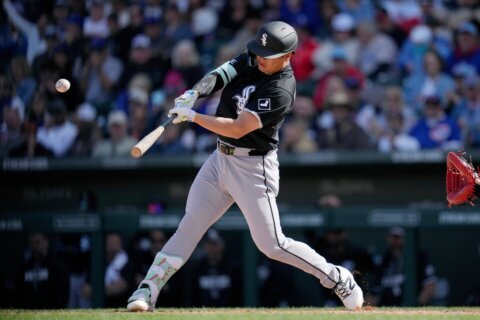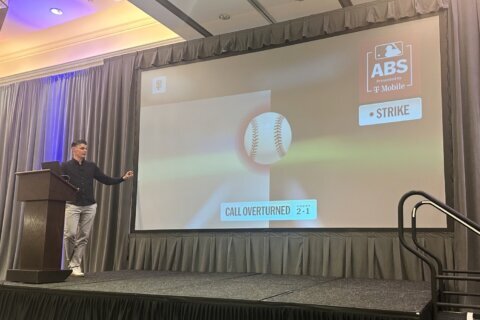WASHINGTON — Every year around this time, the baseball community begins its debates about who belongs in the Hall of Fame. The conversation seems, at times, endless and circular, usually revolving around the differences between how people quantify the game and their various thresholds for Hall of Fame worthiness.
There will likely be several players voted in this year, but no possible selection is more intriguing than that of Tim Raines, the longtime Expo outfielder in his 10th and final year on the ballot.
As a leadoff hitter, the perception of Raines’ value has improved over time as on-base percentage has been realized as a more effective indicator of offensive prowess than batting average. He may enjoy a boost on his final ballot as well, as other recent potential inductees have. But Raines also has a high-profile advocate in his corner, helping shed light on his accomplishments in his final shot at baseball immortality.
That’s because Raines is Jonah Keri’s favorite player.
Keri, of CBS Sports and formerly of Grantland, grew up in suburban Montreal and even wrote a book about his hometown team (which moved to Washington and became the Nationals in 2005), “Up, Up, And Away: The Kid, the Hawk, Rock, Vladi, Pedro, le Grand Orange, Youppi!, the Crazy Business of Baseball, and the Ill-Fated but Unforgettable Montreal Expos.”
“Rock,” if you didn’t already know, is Raines.
On Monday, Keri posted an open letter to Hall of Fame voters outlining the merits of Raines’ candidacies. But what he didn’t mention in the post is that the letter wasn’t simply a public gesture.
“It’s an open letter, but I actually sent it to a few dozen voters who didn’t vote for Raines last year as a way to lobby them,” Keri told me earlier this week.
He said he’s already gotten a few responses back, with a few saying they will be voting for Raines after not voting for him last year. That’s crucial, as Raines’ vote share has inched up the last couple of years, from 203 to 242 to 307 in 2016, just 23 shy of the 330 he needs for induction. The close vote has helped spur Keri into action.
“Raines is: A) my favorite player of all time and B) it’s his last year on the ballot,” he said. “This is just a situation where as much as I’ve tried and written about and spoken about in general terms as a writer, I haven’t really been a lobbyist, exactly, until this year. Because this is the last year, and I feel you have to be more aggressive.”
So, what to make of Raines’ inability to get in so far and whether or not he is deserving? He didn’t reach 3,000 hits, didn’t hit .300 for his career and never finished higher than fifth in MVP voting. He played in the same era with the single greatest leadoff hitter of all time, Rickey Henderson. And for the prime of his career, he was up in Montreal, out of the spotlight, his best chance to shine on the World Series stage extinguished by the 1994 labor stoppage.
But that doesn’t mean his resume isn’t Hall of Fame-worthy. He reached base more times in his career than Hall of Famers Tony Gwynn, Lou Brock, Roberto Clemente, Harmon Killebrew and Mike Schmidt.
“It’s just a walks versus hits thing — that’s all it is,” said Keri.
And walks were incredibly valuable for someone with Raines’ speed. He is one of only five players in MLB history with 800 or more stolen bases — the other four already in Cooperstown — and his 84.7 percent success rate is the greatest ever.
If you prefer newer stats, over an 11-year span from 1983-93, Raines amassed a higher WAR (55.4) than Gwynn (50.5), Paul Molitor (46.0) and Robin Yount (39.6) who each played all 11 of those seasons. There are 135 players with lower career WAR who are already in the Hall of Fame.
And he’s even got a leg up on Henderson in a couple categories: the aforementioned higher stolen base percentage (84.7 to 80.8) and career walk-to-strikeout rate (1.38 to 1.29).
Keri’s doing everything he can to make sure those things don’t get overlooked, but he’s also circumspect about how much influence he really has.
“I think if Raines gets in or not, it’s on his own merits — I’m very careful to really not take credit for this thing,” he said. “Raines is in on his own accomplishments. I’m just some schmuck from the suburbs of Montreal.”
Nevertheless, Keri has gotten to know Raines and his family in the last few years and recently had him on his podcast, making his advocacy more personal. While there are those — this author included — who think sometimes too much is made of the Hall of Fame, it ultimately comes down to what it means to the players themselves.
“I asked Raines this exact question, and he said it’s because of his family,” said Keri. “He cares because it would matter to his dad. He cares because it would matter to his 6-year-old twins. Those are the things that matter to him.”
We’ll know whether the Hall of Fame voters sided with Raines (and Keri) when the results are announced on Jan. 18.







